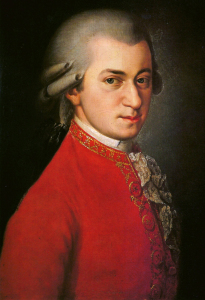By Obie Yadgar
Composer Johannes Brahms said he got his best ideas while polishing his shoes in the morning. Mine come while shaving. Since I also shave leisurely with the traditional straight razor, ideas bounce around longer in my head.
While shaving this morning with Mozart playing in the background, my mind somehow wandered off from the novel I’m working on to the mystery surrounding his death. Before long, I was strolling among the headstones of the great composers who died under peculiar circumstances.
Much speculation surrounds Mozart’s (1756-1791) untimely death, with various scientific studies pointing to complications from strep throat, lack of sunlight — since he slept much of the day and composed at night — kidney problems and other ailments.
I prefer the long held rumor that his rival, the Italian composer Antonio Salieri (1750-1825), poisoned him, even though toward the end of his life Salieri confessed to Rossini that he had nothing to do with Mozart’s death.
Alexander Pushkin (1799-1837) used the rumor for his stage play Mozart and Salieri. Never mind that Pushkin himself was killed in a duel with Georges D’Anthes, a French cavalry officer whom he accused of flirting with his wife.
Being a sucker for a good mystery, I have poked around for other who-done-its in the world of the great composers. For instance, Tchaikovsky was thought to have died of cholera by drinking contaminated water. Now, that story is boring. In truth, his homosexual affair with a young nobleman prompted a court of honor’s decree that the composer take poison. That makes for a good story, but I’m sure Tchaikovsky didn’t think so.
For the Italian baroque opera composer Alesssandro Stradella (1642-1682), it was the women who finally done him in. Stradella ran away with Alvide Contarini’s mistress and the powerful Venetian senator sent 40 of his boys to whack him, but Stradella managed to escape only wounded.
Stradella finally pushed his luck too far by romancing the girl from the powerful Lomellini family in Genoa. He was murdered in a nighttime ambush in the Piazza Bianchi. The hit men were imports, hired by the Lomellinis, or by Contarini, or perhaps by another avenging soul whose woman Stradella had stolen. No one really knows.
Jean-Marie Leclaire’s murder is worthy of the great Dorothy Sayers. Leclaire (1697-1764), the French baroque composer and violinist, was murdered coming home late one night. His gardener was suspect, as well as Leclaire’s long estranged wife Louise, and his nephew, the violinist Guillaume-Francois Vial. Apparently, evidence in the French National Archives points to Vial as the killer, since the two had been feuding. That Vial was never brought to trial thickens the mystery.
The death of the baroque master Jean-Babtiste Lully (1632-1687) is less thrilling compared to that of the others, although it is full of irony. Having survived all the political intrigue in Louis XIV’s court, including an attempted murder when someone spiked his tobacco with cyanide, Lully died of infection after stabbing a toe with his conducting staff. That’s embarrassing for a master who ruled the Parisian musical life with an iron fist.
There are other weird deaths among the great composers — Alkan died when a bookcase toppled over him; Magnard died when he shot at German soldiers entering his estate; and Chausson smashed into a wall while riding his bicycle; and . . .
Well, enough of this nonsense. I have to get back to the novel. One thing is sure, though: no more Mozart with my morning shave.


